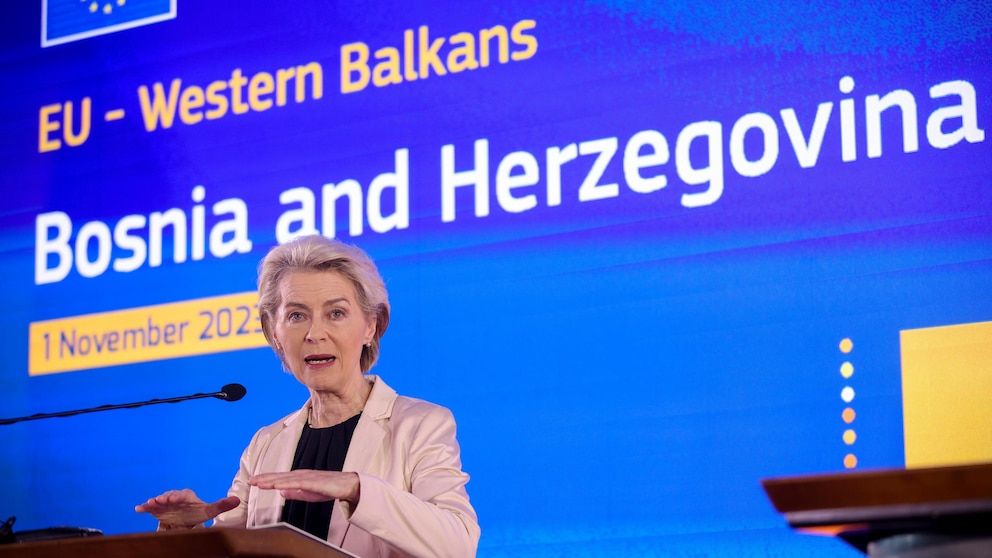Ursula von der Leyen's Western Balkans Tour: Strengthening Economic Ties and EU Pathways
Ursula von der Leyen highlights the EU's 6 EUR billion growth plan for the Western Balkans, pledging to double North Macedonia and Kosovo's economies within a decade. However, the condition is political reconciliation between Serbia and Kosovo.

Source: abc news
European Commission Chief Ursula von der Leyen recently concluded her four-day tour of the Western Balkans, where she underscored the importance of fostering closer economic ties between the Western Balkans and the European Union.
The EU's €6 billion growth plan for the Western Balkans, presented in Tirana in September, offers companies in the region access to the EU's single market in exchange for substantial reforms, including enhancing public administration, ensuring financial stability, upholding judicial independence, and combatting corruption. The European Commission will assess the progress in implementing these reforms on November 8.
As part of the growth plan for the region, she pledged to double the economies of North Macedonia and Kosovo within the next decade, a move seen as a crucial step toward EU accession. But the path to EU membership can only open up if political reforms are implemented in both countries, said von der Leyen. She expressed her encouragement, applauding the North Macedonian parliament's initial steps in constitutional reform to include the recognition of the Bulgarian minority within its territory and committing to an annual review of relations with Sofia.
During her visit to Pristina, she emphasized the significance of normalizing relations between Serbia and Kosovo, citing recent tensions arising from an incident in late September in which a Kosovar policeman was killed by paramilitary troops trained in Serbian military bases. She underscored that both political reforms and the normalization of relations between Serbia and Kosovo are pivotal for the success of the EU's plan, which is expected to boost the Western Balkan region's GDP by 10%. During a joint press conference, she expressed her goal of doubling Kosovo's economy within a decade.
However, therefore Serbia and Kosovo must resolve their differences.
Ursula von der Leyen underscored the importance of normalizing relations between Belgrade and Pristina as a prerequisite for Pristina's potential inclusion in the EU's growth plan and its journey toward EU membership. In her address, she reflected on the historical context of EU enlargement, emphasizing that the history of the European project is intertwined with post-World War II reconciliation and the normalization of relations among nations, and she stressed the necessity for Kosovo and Serbia to engage and collaborate in this endeavour actively.
The European Union's proposal to establish an Association of Serb-majority Municipalities (ASM) in Kosovo's northern region and Serbia's acknowledgement of Kosovo's de-facto independence remain central points of contention. Despite Kosovo declaring its sovereignty in 2008, Serbia continues to consider Kosovo as one of its provinces.
The ongoing tensions between Belgrade and Pristina pose a potential risk to EU investments. The Ohrid Agreement, formulated in March 2023, provides a roadmap for peace and cooperation between Kosovo and Serbia. During von der Leyen's stop in Belgrade, Serbian President Aleksandar Vučić reaffirmed Serbia's commitment to maintaining peace and stability:
"Serbia is committed to preserving peace and stability. Serbia knows its obligations. Serbia, in accordance with the agreement, will fulfil its obligations."
In Bosnia and Herzegovina, von der Leyen presented the Growth Plan for the Western Balkans and highlighted the importance of concerted efforts to bring the region's economies closer to the EU. She emphasized that the future of Bosnia and Herzegovina lies in becoming a single, united, sovereign country within the EU.